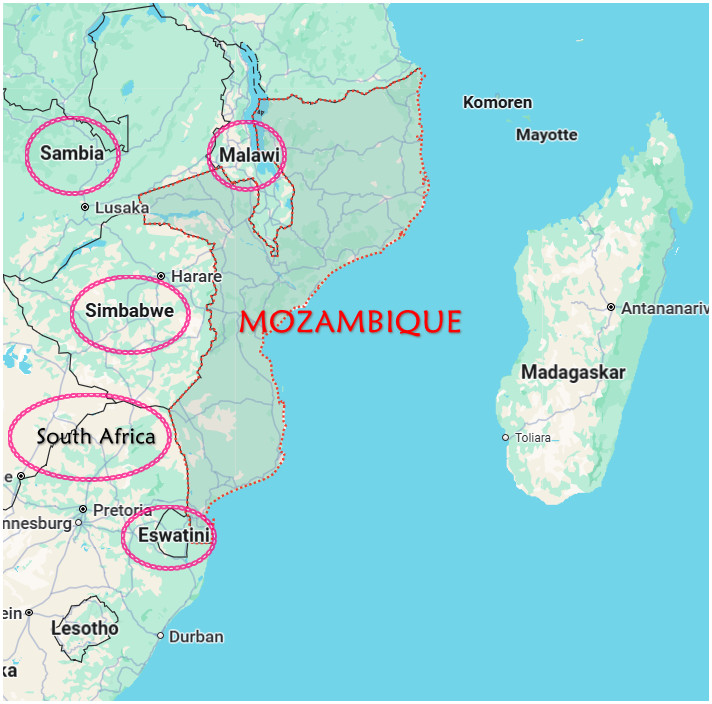Mozambique - Malawi - Zambia Tripartite Agreement
The 2023 Tripartite Agreement: Enhancing Regional Connectivity through the Nacala Corridor
The signing of the 2023 Tripartite Agreement among Mozambique, Malawi, and Zambia marks a significant milestone in fostering regional connectivity and economic integration in Southern Africa. Focused on the Nacala Development Corridor, this agreement aims to streamline the management of this vital trade route, reduce transport costs, and bolster competitiveness for all three nations. In this article, we will explore the context and background of the agreement, its objectives, key features, and the potential impacts on regional trade and development, all while considering recent developments and ongoing challenges.
Geographical and Economic Context

The Nacala Corridor serves as a crucial trade artery, connecting the deep-water Port of Nacala in Mozambique's Nampula province (14°30′S, 40°41′E) to Malawi and Zambia. This strategic location highlights Mozambique's role as a gateway for landlocked neighbors, allowing them increased access to global markets. In 2023, the Nacala Port handled around 2 million tons of cargo annually, encompassing essential commodities such as coal and agricultural products, including tea and tobacco. The Nacala railway, which spans 912 kilometers, was rehabilitated with a $1.7 billion investment from Vale Moçambique, linking Mozambique's Tete coalfields to Malawi and further facilitating trade.
For Mozambique, this corridor is a key economic driver, primarily relying on port revenues and coal exports, which constituted 57% of $8.27 billion in total exports in 2023. In contrast, Malawi's economy heavily depends on agriculture, employing approximately 80% of its workforce, while exporting products via the Nacala Corridor. Zambia, primarily a copper-exporting nation, also stands to benefit from more efficient trade routes that connect it to global markets through Mozambique's ports.
Historical Cooperation
The historical ties among Mozambique, Malawi, and Zambia date back to colonial times, with shared infrastructure projects like the Cahora Bassa dam highlighting their interconnectedness. Since the early 2000s, various agreements have strengthened their economic and trade relations. The 2005 Mozambique-Malawi trade agreement established preferential trading terms that facilitate cross-border commerce. Additionally, the respective countries' participation in regional organizations like the Southern African Development Community (SADC) has fostered collaborative efforts and collective goals.
Objectives of the 2023 Tripartite Agreement
Signed on October 8, 2023, during the inauguration of the upgrades to Nacala Port, the Tripartite Agreement's objectives include:
Integrated Corridor Management: Establishing a new paradigm for effectively managing the Nacala Corridor, the agreement promotes seamless movement of goods and people among the three nations through a joint coordination body.
Cost and Time Reduction: The agreement aims to lower transport costs and transit times, targeting a 10% reduction in costs, based on World Bank estimates, to enhance the competitiveness of goods moving through the corridor.
Economic Growth: The Tripartite Agreement seeks to boost trade volumes and strengthen regional connectivity, in alignment with SADC's broader goals and the objectives set out by the AfCFTA.
Infrastructure Coordination: The agreement emphasizes developing essential railway links, such as the Chipata-Mchinji section, and aligning road and rail investments to maximize corridor efficiency.
Key Features of the Agreement
Tripartite Management Framework
The establishment of a joint coordination body under the agreement is critical for overseeing corridor operations. This body will facilitate customs, logistics, and infrastructure maintenance, ensuring continuous cargo flow and addressing bottlenecks at key border points like Mandimba (Mozambique-Malawi) and Mwanza (Malawi-Zambia).
Infrastructure Commitments
The agreement prioritizes essential infrastructure improvements, with a focus on completing the Chipata-Mchinji rail link connecting Zambia to Malawi and upgrading the Nacala railway to enhance its capacity. Additionally, the commitment to road upgrades will support the paving of 300 kilometers of the EN12 route, which is vital for trade.
Trade Facilitation
By simplifying customs procedures and aligning with AfCFTA's Rules of Origin and Sanitary/Phytosanitary (SPS) protocols, the agreement will aim to reduce clearance times at borders by an estimated 20%. The agreement also promotes duty-free trade for agricultural exports, including Malawi's tea and Zambia's copper, building on prior agreements.
Economic and Social Benefits
The agreement envisions creating new job opportunities and fostering SME growth, particularly benefiting women and youth involved in agriculture. By enhancing regional energy trade, particularly the potential for Zambia to access Mozambique's Cahora Bassa hydropower (1,500 MW), the agreement aims to broaden economic opportunities.
Impact on Mozambique and the Region
The implementation of the Tripartite Agreement holds significant potential for economic benefits across the region:
Economic Benefits
The agreement could result in a 10% increase in Mozambique's intra-African exports, translating to an additional $800 million by 2030. With an expected 20% increase in the cargo handled through Nacala, the corridor will further solidify its status as a key trade route. Alongside this, the gains in Malawi's agricultural exports and Zambia's copper sales will enhance the region's competitive edge in global markets.
FDI Attraction
Stability in corridor management under the Tripartite Agreement is essential for attracting further foreign direct investment. The projected investments of $500 million to support corridor development will have positive ripple effects in other sectors, especially where infrastructure improvements align with the goals of natural resource extraction and agricultural enhancement.
Regional Connectivity
The enhanced connectivity provided by the agreement will significantly benefit landlocked nations. The Nacala Corridor's proximity allows for reduced transit times—significantly cutting costs for essential goods such as fertilizers and wheat imports to Malawi, and providing cheaper routes for Zambia's copper exports.
Challenges and Risks
Despite the optimism surrounding the Tripartite Agreement, several challenges must be navigated:
Insurgency: The ongoing unrest in Cabo Delgado has previously disrupted operations, resulting in substantial trade losses. While stabilization efforts are in place, uncertainties remain.
Infrastructure Gaps: With only 60% of the Nacala railway operational, Mozambique faces challenges in upgrading infrastructure to meet growing trade demands.
Coordination Efforts: Diverging priorities among the nations—as Malawi focuses on agriculture while Mozambique emphasizes coal—can result in bureaucratic delays and misalignment in trade objectives.
Debt Constraints: The financial constraints arising from previous economic challenges, including Zambia's debt crisis and Mozambique's "hidden debt" scandal, hamper public funding for necessary investments.
Climate Vulnerability: Mozambique's susceptibility to climate change, particularly flooding that impacts trade routes, poses significant risks to trade stability.
Recent Developments
The recent inauguration of the Port of Nacala upgrades, celebrated by the leaders of Mozambique, Malawi, and Zambia, signifies the commitment to improving regional trade infrastructure. The World Bank's support, along with the development of projects under the SADC umbrella, points toward a collective acknowledgment of the need to enhance regional trade corridors.
Programs aimed at capacity building, exemplified by workshops conducted by the AfCFTA Secretariat, illustrate efforts to prepare SMEs for engaging in trade under the new frameworks, ensuring a more inclusive economic landscape.
summary
The 2023 Tripartite Agreement among Mozambique, Malawi, and Zambia represents a strategic advancement in the management and efficiency of the Nacala Development Corridor. By fostering integrated management, reducing transport costs, and enhancing regional competitiveness, this agreement solidifies Mozambique's role as a vital trade gateway. Despite the challenges that lie ahead, the potential for increased trade, job creation, and economic growth indicates a promising path for sustainable development in Southern Africa. As Mozambique.
